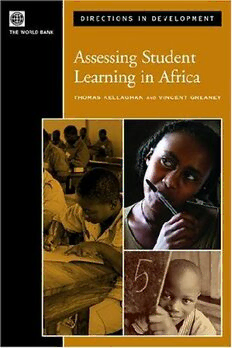
Assessing Student Learning in Africa (Directions in Development) PDF
100 Pages·2004·0.543 MB·English
Most books are stored in the elastic cloud where traffic is expensive. For this reason, we have a limit on daily download.
Preview Assessing Student Learning in Africa (Directions in Development)
Description:
Education for All, supported by the international community, emphasizes the importance of learning quality. This book focuses on the use of assessment to monitor and evaluate learning in Sub-Saharan African countries. It deals with four major aspects of educational assessment: public (external) examinations, national assessments of educational achievement levels, international assessments, and classroom assessment practices. Coverage of public examinations includes a review of their quality, their potential for leveraging reform, and their positive and negative impacts on the nature of teaching and learning. Assessing Student Learning in Africa summarizes the range of national assessment activities carried out in the region. These assessments were designed to provide evidence on the outcomes of schooling, especially in terms of student achievements. The relatively few international assessments that have been carried out in Africa have reported relatively low levels of student achievement. Pros and cons of participating in international assessments are discussed. Classroom-based assessment is an integral component of the teaching learning process. The evidence presented suggests that current teacher assessment practices are deficient in specific areas. Throughout the book, the authors offer concrete suggestions of how to improve assessment practices to help enhance the quality of student achievement.
See more
The list of books you might like
Most books are stored in the elastic cloud where traffic is expensive. For this reason, we have a limit on daily download.
